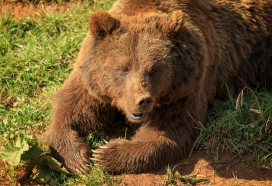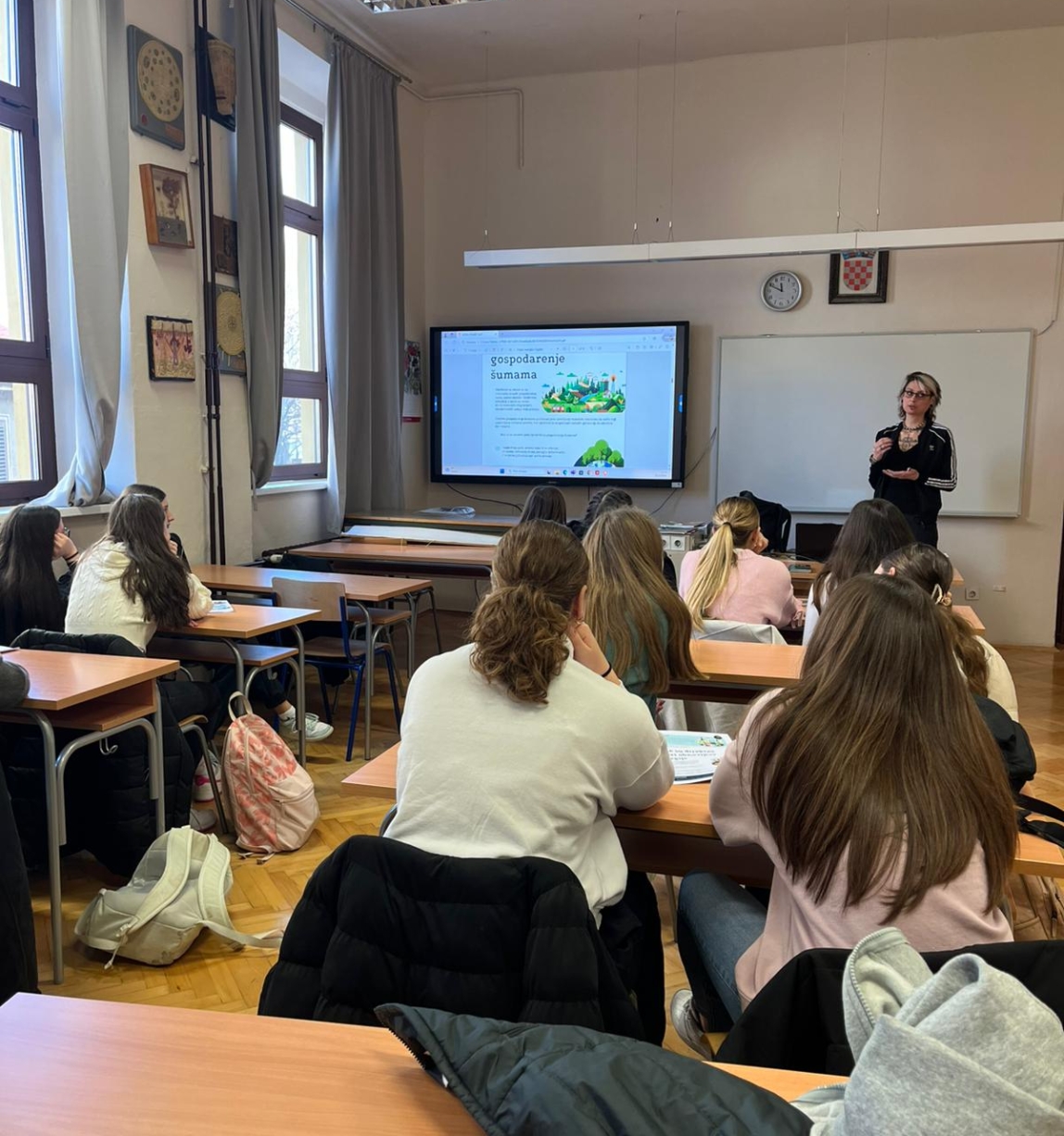
FSC has joined 100+ NGOs supporting the #Together4Forests movement.


Bringing forestry education into the classroom can be a challenge. In Finland, Switzerland, Croatia, and the United Kingdom, new approaches are emerging. A simulation game for Swiss universities, co-designed learning materials in Finnish forestry schools, interactive forest knowledge toolboxes for Croatian high schools, and education resources for UK primary and secondary schools; these initiatives all aim to encourage future generations to get to know forest ecosystems and sustainability.
 To test new materials and receive direct feedback, the team at FSC Adria-Balkan recently visited two high schools - one located in Croatia's coastal north and the other in a mountainous, forest-rich region. Despite their contrasting landscapes, both schools provided valuable testing grounds.
To test new materials and receive direct feedback, the team at FSC Adria-Balkan recently visited two high schools - one located in Croatia's coastal north and the other in a mountainous, forest-rich region. Despite their contrasting landscapes, both schools provided valuable testing grounds.
Partnering with Ana Fornazar, a Croatian forestry consultant with expertise in forestry and pedagogy, who is also president of the Istria Model Forest, FSC wanted to evaluate the reception, interactivity and effectiveness of five newly developed educational modules on forests.
The evaluation involved three first-year biology classes (ages 14–15). During a 15–20-minute session, a biology teacher presented one of the modules, after which students received printed copies of all five for individual exploration. The session concluded with students and teachers completing a structured test to assess their preferences and suggestions for improvement.
Students responded positively to the materials and shared valuable suggestions for enhancing accessibility and usability. Some of them appreciated how the materials connected forests to Croatia’s own environment, making the subject more tangible and closer to their daily lives. As one student noted, “I’ve never really thought about forests much. I guess it’s because there aren’t any nearby, but learning about them in this way makes me realize how important they are.” Another commented: “It's exciting to learn something about them that we don't typically cover in other subjects”.
Petra, a teacher from the coastal school in Pula, shared: “The new educational modules reflect our students’ needs and interests. Teachers often struggle to find quality and accessible resources to educate students about climate change and the importance of natural resources. Initiatives like these play a crucial role in bridging that gap, providing environmental science materials with an engaging and student-friendly approach that captures their interest.”
Teachers highlighted the challenge of maintaining student attention and stressed the importance of concise, visually appealing, and informative content. Overall, feedback was positive. Many noted that the modules successfully integrated multiple scientific disciplines and suggested they could also be appropriate for the final year of middle school.
Teachers also discussed format preferences, with a general consensus that PowerPoint presentations might better support structured lesson plans. Additionally, they recommended collaborating with the Provincial Association of High School Professors to explore the modules’ integration into official curricula.
Based on the collected feedback, the next steps involve refining both the format and accessibility of the modules. The team will assess whether to maintain print-only resources, transition to digital formats, or adopt a hybrid approach.
Dissemination will also be a key focus. Potential outreach strategies include leveraging teacher-focused Facebook groups, forming partnerships with relevant organizations, and communicating directly with schools via email.
These school visits offered invaluable insights that will guide the future of the project in Croatia. Through active participation from both students and teachers, FSC aims to create educational materials with regional relevance - and potentially broader international appeal. It’s a small but meaningful step toward fostering environmental literacy and integrating sustainable forestry into everyday learning.
If you need help downloading the educational toolboxes or would like to collaborate with FSC Adria-Balkan on teaching activities, please contact the team at adriabalkan@fsc.org.
In the United Kingdom, FSC UK relaunched our education initiative in 2024, to address knowledge gaps identified through consumer research. The 2024 FSC UK consumer survey revealed widespread confusion about which materials – such as cork, bamboo, and viscose – actually come from trees, highlighting the importance of early forest education.
The project focused on developing resources for Key Stage 2 students (ages 7-11) and Key Stage 3 students (ages 11-14), creating lesson plans, PowerPoint presentations, and a dedicated education webpage. What distinguishes the UK approach is its emphasis on strategic partnerships with established educational organizations including Young People's Trust for the Environment (now Better Planet Education), LEAF/Foundation for Environmental Education, Eco Schools England, Education Otherwise, and BIAZA.
A particularly successful collaboration emerged with Better Planet Education, which worked directly with FSC UK to produce the “What is FSC?” lesson plan. This partnership resulted in resources being featured online at Better Planet Education’s platform, providing teachers with easily accessible, curriculum-aligned materials. The initiative generated press coverage in forestry publications and attracted 636 views to the dedicated FSC UK education webpage since its August 2024 launch.
FSC UK plans to continue developing our educational offerings in 2025 and beyond, emphasizing collaboration with relevant partners as a key strategy for expanding reach and ensuring materials remain current and engaging for educators and students alike.

In Switzerland too, new ways to make sustainable forestry education more engaging are emerging, going beyond traditional school materials. WaldWege (in English: Forest Paths) is a simulation game that drives participants into the complex dynamics of responsible forest management. Aimed at university students and young adults, it encourages systems thinking and critical reflection by simulating long-term impacts of forest management decisions and value chain choices across various timescales.
This engaging learning tool is being developed through collaboration with LEAF Inspiring Change and the Zurich University of Teacher Education. FSC Switzerland also plans to adapt the game for younger audiences, including primary school students, in the coming years.
This immersive experience offers an innovative learning approach that FSC Switzerland is developing through collaboration with LEAF Inspiring Change and the Zurich University of Teacher Education (PHZH). Further development routes involve didactic reconstruction in collaboration with PHZH and BNE (Bildung für Nachhaltige Entwicklung - Education for Sustainable Development) to target 7- to 8-year-old children and to enable teachers to run the game independently over the course of 2026/2027 and beyond.
Other development paths include making the game more complex by specifically addressing stakeholders in the construction sector who are responsible for sourcing sustainable timber, with promising potential partners from industry. Further testing and geographic adaptions will let the game be used in other European contexts. These expansions will make the game accessible to different educational levels and address crucial training needs in industry.
In Finland, forestry schools and universities of applied sciences are integrating new FSC-related content into their curricula. These educational materials are based on the Finnish Forest Stewardship Standard and cover both the technical and ethical aspects of sustainable forestry.
Students explore practical topics such as creating buffer zones near water bodies, retaining ecologically valuable trees, conserving biodiversity, protecting High Conservation Value (HCV) forests, and avoiding logging during bird nesting seasons. They also learn about forest operations, including regeneration, clearing, thinning, and the responsible use of pesticides and fertilizers.
What makes these tools unique is their participatory creation process. Teachers were consulted through a survey, which helped shape resources tailored to their needs - including a certificate upon completion. Students’ feedback was highly valued throughout the collaboration, leading to materials that students particularly enjoy, as they reflect their interests and preferred formats.
Thanks to these projects, knowledge about responsible and sustainable forest management practices is expanding among future citizens and professionals, with FSC being introduced at school and university.